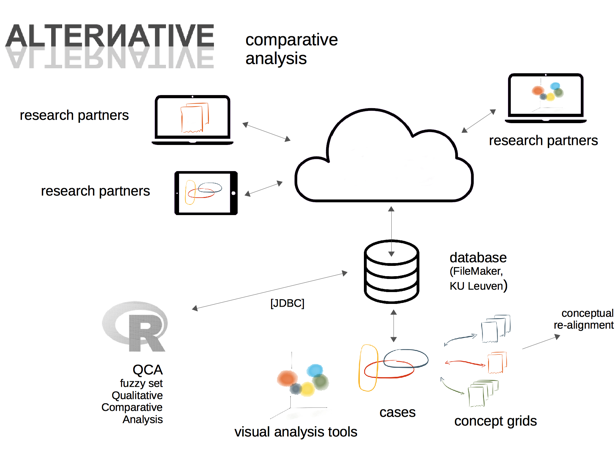Database solution for qualitative comparative analysis and collaborative research in the social sciences

The ALTERNATIVE project (FP7, 2012-2016) is about Developing alternative understandings of security and justice through restorative justice approaches in intercultural settings within democratic societies.
At the project’s core there are four intensive case studies (which mainly take the form of action research activities) built around, supported by and mutually feeding into three more theoretically oriented work packages and thus into the project as a whole. A comparative and dissemination work package have been incorporated into the research to make the flow of information and action possible on all directions. These different parts together are to produce a spectrum of theoretically grounded and empirically tested models of dealing with conflicts in intercultural settings by RJ oriented processes.
The comparison happened on two dimensions. A ‘vertical’ one, following the ethnographic method of continuous dialogue between the etic and emic understandings of the key concepts in each site. The ‘horizontal’ gaze compared the findings in the different research sites between themselves.
The empirically rich and thickly described conceptual reflections collected by the researchers are recorded and exchanged under the form of ‘evaluation grids’. They are the main methodological tool and communication protocol of the comparative component of the project.
In order to allow the researchers in the four sites to follow the developments of the comparative analysis and as a tool for qualitative analysis, this author designed and implemented in FileMaker Pro a database to store, code and analyse the evaluation grids making it accessible to partners via website and a dedicated solution for the iPad. As part of the data processing protocol, the grids themselves are uploaded to the online database that allows for structured queries by keyword or properties across all the fields of the grid itself, e.g. key or secondary concept, work package, thick description, local language, societal ecology, etc.

The concept-centric evaluation grids had been designed aiming at the conceptual realignment within each working group and across the project as a whole. However, they were not well suited to analyse the outcomes of the action research. Therefore, a further methodological development consisted in trying to broaden the case-based methodology of one of the research partners and – with some inevitable stretching – make it adaptable to the other sites. Each evaluation grid analyses a concept starting from a thick description of a ‘situation’ during the action research and its societal ecology. These thickly described situations are suitable to be thematised and analysed as ‘cases’ (see section 1.5.1 at page 23). Switching to the ‘case’ as unit of analysis allows to focus on tracing processes within it, participatory ones in particular, and analyse the action research’s outcomes. The case formalisation, linked to the evaluation grids, together with a charting and visual analysis tools were implemented in the shared database as well.
The remotely accessible shared database at the centre of the collaborative data management infrastructure has the following main functions:
— Data entry and validation
— Linking the grids with formalised ‘cases’ or observed situations that they thickly describe and that can be considered units of analysis
— Characterising each ‘case’ along a set of formally defined conditions (or variables, see section below)
— Conceptual analysis and feedback to the work packages for conceptual re-alignment based on the grids.
— Set-theoretical, visual analysis tools of the cases for synoptical overviews and quick hypothesis testing.
— The database feeds the Qualitative Comparative Analysis system coded in R, a free software environment for statistical computing and graphics.
Read the full report (pdf) on the ALTERNATIVE project website, chapter 1 on “Methods and data”.



